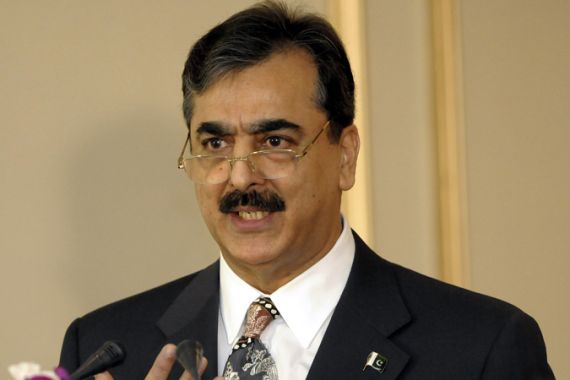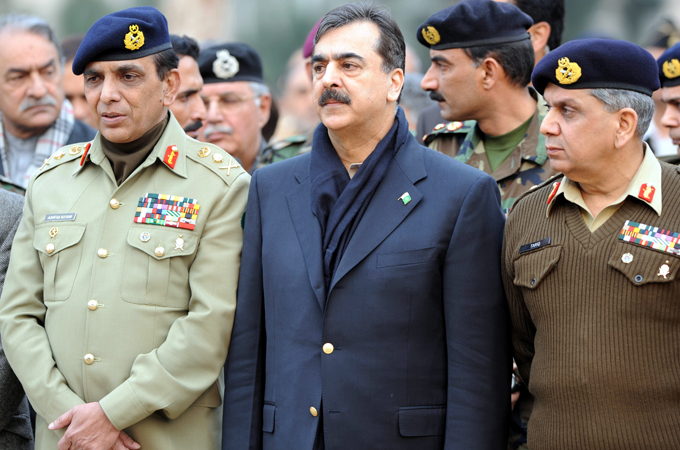Pakistan PM fears plot against his government
Gilani says certain institutions behave like a state within a state, but army chief rejects “speculations” of takeover.

 |
| Gilani criticised the security forces’ inability to detect Osama bin Laden’s presence on Pakistani soil [EPA] |
Yousuf Raza Gilani, Pakistan’s embattled prime minister, has said conspirators were plotting to bring down his government, delivering an unprecedented tirade against the country’s powerful military.
Without directly naming the military, Gilani said on Thursday that certain institutions were behaving like a state within a state and warned that everyone should obey the elected parliament.
“I want to make it clear that conspiracies are being hatched here to pack up the political government,” he said, speaking to an audience at the National Arts Gallery.
But the country’s powerful military pledged on Friday to continue supporting democracy, reiterating it was not planning a takeover.
An army statement quoted military chief, General Ashfaq Kayani, as telling troops the military will continue to support democracy in Pakistan and that any talk the army was planning to take over was “speculation”.
Gilani’s outburst comes at a time when the government is being increasingly isolated over a letter allegedly written by former envoy to Washington Husain Haqqani, asking the US to help avert a military coup in Pakistan after the killing of Osama bin Laden.
Rampant speculation that President Asif Ali Zardari could be forced out of office over the scandal has refused to die, despite his return to the country following two weeks of medical treatment in Dubai.
Two weeks ago, Interior Minister Rehman Malik dismissed rumours that a coup could overthrow the government, but Gilani’s remarks appeared to show that members of the administration believe their early departure is possible.
At the gallery, Gilani called the army “disciplined”, saying that they “follow the constitution” and “will remain under the government”.
‘No control over armed forces’
But heading off questions in the parliament, he took aim at the army after the defence ministry told the Supreme Court “it does not exercise any operational control” over the armed forces or ISI, the country’s powerful intelligence agency.
“If they say that they are not under the ministry of defence, then we should get out of this slavery, then this parliament has no importance, this system has no importance, then you are not sovereign,” he told lawmakers.
“Nobody is above the law, all the institutions are subservient to the parliament,” Gilani insisted.
Appearing to lose patience, he said the government had stood by the security services over a storm of US pressure over the bin Laden’s presence on Pakistani soil, the November 26 NATO attack, and the 2008 attacks on Mumbai.
“In the worst circumstances we doubled their salaries. They have to be accountable to parliament.”
“But I want to ask how was (bin Laden) living here for the past six years? On what type of visa was he living here? Why was security not taken care of, if he entered Pakistan without a visa?”
President Zardari and his government have earned praise for successfully navigating scandals and calls for their resignation since taking office after the Pakistan People’s Party (PPP) won elections in February 2008.
But any decision from the Supreme Court to investigate the memo, as recommended by the military, would build significant pressure on the president at a time of huge tension between the army and the civilian government.
Elections are not due until February 2013, but the opposition has begun campaign rallies in earnest and many observers expect polls some time in 2012. No civilian leader in Pakistan has ever completed a full term in office.
Former prime minister Nawaz Sharif this week demanded snap elections.